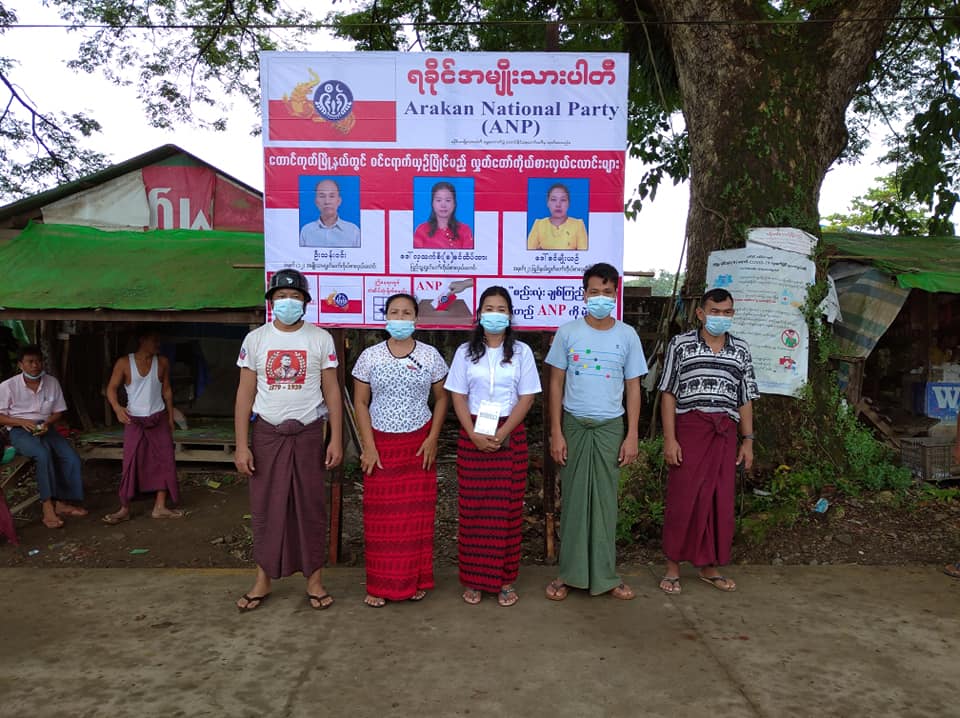The locally popular Arakan National Party (ANP) has defeated the ruling National League for Democracy in Rakhine State, taking a majority of the constituencies in Sunday’s election.
The ANP win adds Rakhine State to the list of ethnic areas where the NLD has found it difficult to compete despite its overwhelming electoral victory in other parts of Myanmar.
In this war-ravaged state where the military and the Arakan Army have been fighting for several years, the 2020 election was cancelled by the Union Election Commission (UEC) in nine northern townships due to the threat of armed violence.
Voting was limited to the state capital Sittwe and southern Rakhine State, where only 25 percent of its 1.6 million eligible voters were allowed to exercise their right to vote.
According to preliminary results, Rakhine State chief minister U Nyi Pu was re-elected from Gwa constituency no. 2 on Sunday, but the NLD has lost its seats in Taungup, Ramree, and Manaung townships, which were the ruling party’s stronghold in 2015.
Daw Hla Thet Soe, the MP-elect for Lower House seat in Taungup Township, secured 5,150 votes, beating her rival NLD candidate Daw Ni Ni May Myint by just over 700 votes.
Taungup was also unable to hold a township-wide election, as most of its village tracts were on the UEC’s voting-cancellation list.
Current lawmaker Daw Ni Ni May Myint is among the three NLD candidates held by the Arakan Army last month during a campaign trip and their fate is yet unknown.
All three NLD candidates competing for Taungup lost their election bids as ANP candidates also won the Upper House seat and a state seat for Taungup constituency no.2.
Daw Hla Thet Soe told The Irrawaddy on Monday that at least 15 ANP candidates won for the Upper House, Lower House and state parliamentary seats in Taungup, Ramree, Manaung townships in the southern part and at the capital Sittwe.
“This is a success on the part of the party because these constituencies were never ANP’s strongholds. We lost in the previous elections [in 2015]. But we will work our best to reflect our supporters’ needs and the development of the state,” she said.

She added that the ANP had hoped to win all contesting seats, despite the fact that the election being held in only part of Rakhine State.
The ANP had mobilized its supporters by urging them to support the state-based ethnic party rather than an “outside party” or “Bamar party.” And many ethnic Rakhine voters responded by choosing candidates of their own ethnicity.
The ANP won 22 seats in the Union Parliament and the majority (23) seats in state parliament in the 2015 elections. However, its goal of appointing the Rakhine State Chief Minister at that time was not fulfilled, putting the ANP in opposition to the NLD.
According to the 2008 Constitution, the President appoints the chief minister rather than the state’s majority winners. After the 2015 election, the NLD’s efforts to amend the Constitution failed to focus on the issue of appointment of the chief minister. As a result, the rift over the issue never healed.
Adding to dismay are the Rakhine State armed conflicts between the AA and the military as well as a failure of leadership by the state government under the chief minister appointed by the NLD. Another sore point was the UEC’s last-minute decision to cancel voting in northern parts, which are the ANP areas.
In 2020, NLD secured seats in Gwa and Thandwe townships including two Lower House seats and an Upper House seat for these two townships.
Another Rakhine party, Arakan Front Party also won two state parliamentary seats for Kyauk Phyu.
U Kyaw Lwin, a state lawmaker for Kyauk Phyu, who contested in the election as an independent candidate for the upper house for Kyauk Phyu and Manaung townships said his chance to win the election had been slim, as his main rival was a ANP candidate with strong support from Manaung.
Besides, he added, more than 100,000 eligible voters in Kyauk Phyu were unable to vote due to partial cancellation of voting there.
The USDP candidate won a seat for An constituency no.2, which has been its stronghold since 2010, as the military stations its battalions there.
However, with fewer MP-elects in the state parliament and subsequent formation of the state government with those elected, the capability of the State assembly is in question, said U Kyaw Lwin.
You may also like these stories:
NLD Leads in Mon State but With Some Losses to Local Mon Party
NLD Set to Sweep All Seats in Ayeyarwady Region, Initial Voting Results Show
Thai Ambassador Praises Myanmar’s Election Handling

















